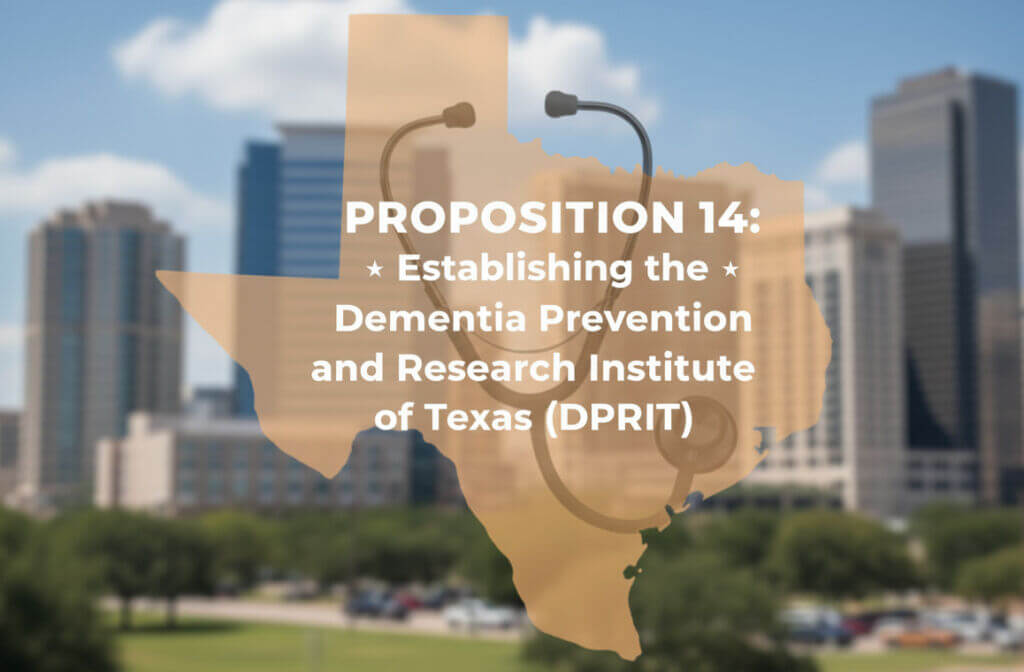Proposition 14: Creating the Dementia Prevention & Research Institute of Texas (DPRIT)

For years, Texas has been cultivating an environment that attracts the greatest minds, talent, and innovators in the field of medicine from across the globe. From Houston’s Texas Medical Center – now a mini-city that has become the largest medical center in the world – to the Cancer Prevention & Research Institute of Texas (CPRIT), as well as the top-ranked UT Southwestern and Baylor University Medical Centers in Dallas and Dell Children’s Medical Center in Austin, Texas’ medical institutions are home to breakthroughs and advancements in health care that have positively impacted countless lives.
Now, with the passage of SJR 3 during the 89th Legislative Session, Texas voters have an opportunity to make our state a leader in the cognitive health care field by approving an amendment to the Texas Constitution establishing the Dementia Prevention and Research Institute of Texas (DPRIT).
Proposition 14 would establish DPRIT as a permanent state institution and create the Dementia Prevention and Research Fund to provide money for research on the prevention and treatment of dementia, Alzheimer’s disease, Parkinson’s disease, and related disorders—injecting $3 billion of existing general revenue funds into dementia and neurodegenerative disease research without requiring an increase in taxes.
Modeled after the success of CPRIT, the new DPRIT would have similar built-in accountability mechanisms – including oversight boards, grant vetting, and performance metrics – to ensure responsible stewardship of taxpayer dollars.
CPRIT proved to be a major strategic investment in science, attracting more than $11 billion in outside investment and adding tens of thousands of high-skilled jobs the Texas workforce. DPRIT presents a similar opportunity to expand our investments in the biotech, pharmaceutical, and life-science sectors.
Importantly, DPRIT will also create a platform for universities, hospitals, and private companies to collaborate on grants, technology capabilities, and commercialization. By driving innovation, investment, and skilled job creation at home, Texas will advance its position as a premier destination for top researchers and medical startups working in neuroscience, pharmaceuticals, and aging technologies—keeping Texas competitive with major research hubs like Boston and San Diego.
There is also a compelling business case for DPRIT – Dementia and related conditions carry significant economic costs for employers through lost productivity, absenteeism, and rising health care expenses. In fact, nearly 12 million Americans provide unpaid care for a family member or friend with dementia, with the value of these unpaid hours valued at $413.5 billion. As more employees become caregivers for aging parents, employers face increased turnover, burnout, and higher health care costs. By focusing on prevention, treatment, and early detection, the work of DPRIT can ultimately help reduce long-term health care costs and improve workforce participation.
DPRIT’s funding would help bolster our state’s robust advanced medicine research landscape through channeled funding to Texas hospital systems, academic centers, and biotech corridors, especially in the ‘Texas Triangle.’ With the expansion of research and care facilities, DPRIT would also generate opportunities for construction, new supply chain activity, and professional service work for those industries.
Proposition 14’s bold investment has the potential to transform the health care landscape in our state, elevate our research capabilities, expand our life science infrastructure, inject new investment in the Texas economy, and change lives for millions of Texans and their families.
To read the full text and explanatory statement for Proposition 14, click here.
–Glenn Hamer, President & CEO, Texas Association of Business
###
